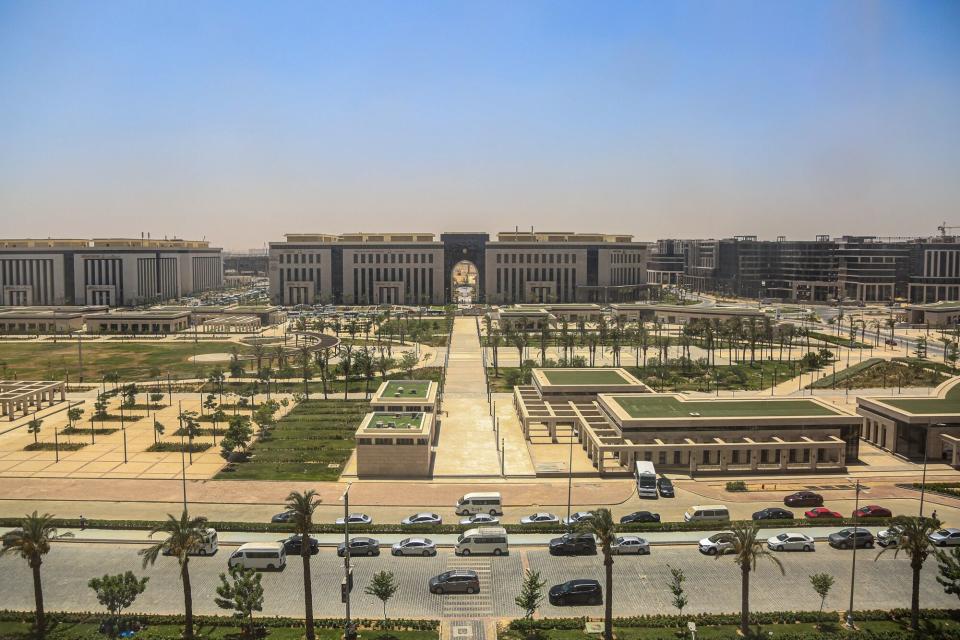Egypt Calls December Presidential Vote as Economic Woes Mount
(Bloomberg) -- Egypt will hold its next presidential election in December, with the vote taking place earlier than expected as authorities face pressure to devalue the currency and take other steps to end an economic crisis and unlock funding from the International Monetary Fund.
Most Read from Bloomberg
Indians Have Five Days to Deposit $3 Billion in Soon-to-Be-Withdrawn Banknotes
Bonds Sink, S&P 500 Snaps Four-Day Losing Streak: Markets Wrap
Until recently, it was widely expected that the polls wouldn’t take place until the first few months of next year, with Egyptian state media typically referring to an election in 2024. The government’s plans changed in recent weeks and Bloomberg reported on Sept. 14 that it was considering elections as soon as December.
An earlier election date would open the door to progressing with economic reforms sooner, said Monica Malik, chief economist at Abu Dhabi Commercial Bank PJSC. “Any substantial reforms, including another meaningful pound devaluation, would likely occur only after the presidential elections,” she said.
Egypt Considers Holding Presidential Vote as Soon as This Year
President Abdel-Fattah El-Sisi, who first took office in 2014, has yet to announce whether he will stand again. But the former defense minister is widely expected to run and win, pressing ahead with big infrastructure projects his supporters say have heralded a new era for Egypt.
His critics say the hundreds of billions of dollars spent on everything from roads to railways and a new administrative capital on the edge of Cairo have have left the Middle East’s most populous nation with too much debt and triggered its worst foreign currency crunch in years.
Egyptian expatriates will cast their ballots on Dec. 1-3 and voting in the country will take place on Dec. 10-12, Walid Hamza, head of the National Election Authority said Monday.
The decision to hold the vote in December comes as the government works slowly to implement a reform plan agreed when the IMF signed off on a $3 billion loan program last year. It needs to execute that plan to get all the funds.
A key part of the IMF deal involved a commitment to shift to a flexible currency regime to avoid building up pressures in the monetary system. Instead, despite three devaluations since early 2022, the Egyptian pound remains overvalued compared the black-market rate.
The pound trades on the official market at around 30.9 per dollar, but is roughly 20% weaker at around 39.5 on the parallel market, underscoring the scarcity of hard currency in Egypt. In June, El-Sisi warned the nation wouldn’t be able to tolerate much more weakening of the pound, lest it quickens inflation that has since risen to a record of 37%.
The country’s dollar-bond yields average more than 16%, according to Bloomberg indexes, one of the highest levels in emerging markets and indicative of investors’ wariness.
Egypt Reappoints Central Banker as Devaluation Looms Again
The IMF has so far held off on conducting the first review of the program with Egypt. It was initially expected in March.
The economic malaise created a headache for Egyptian officials, who were forced to choose between devaluing for a fourth time ahead of the vote or holding an earlier ballot. It’s still unclear if the IMF review and any further devaluation will happen before or after the election.
The announcement now opens the door for candidate registration and campaigning.
Egypt’s El-Sisi Bags Election Win Against ‘Mousa Something’
El-Sisi won the last election in 2018 by a landslide. His sole opponent — a political unknown and El-Sisi supporter — entered the race shortly before the cut-off. Other nominees were largely sidelined amid what critics said was a sweeping crackdown on possible rivals.
The president took office a year after leading a military-backed popular uprising that ousted his Islamist predecessor, Mohamed Mursi.
--With assistance from Mirette Magdy.
(Updates with quote in 3rd paragraph.)
Most Read from Bloomberg Businessweek
Why Retiring in India No Longer Requires Living With the Kids
Why Dollar General Might Just Be the Worst Retail Job in America
©2023 Bloomberg L.P.



